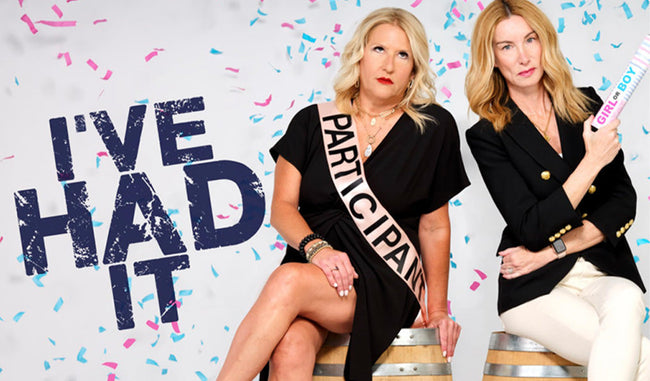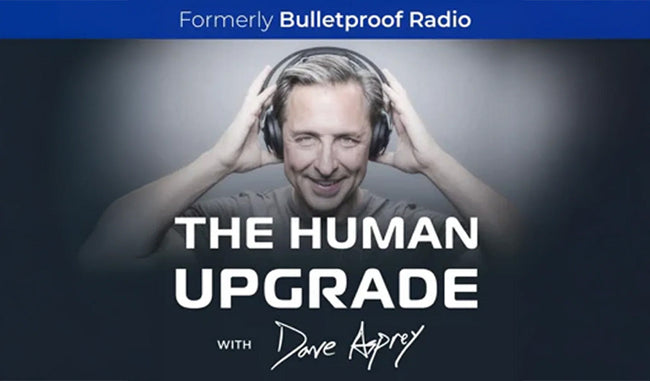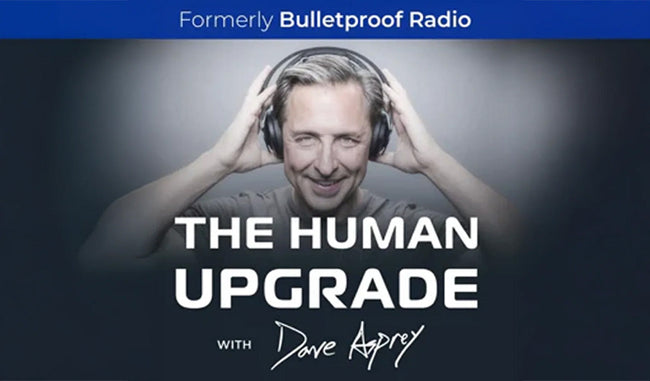Announcer: Bulletproof Radio, a state of high performance.
Dave: You're listening to Bulletproof Radio with Dave Asprey.
Today's cool fact of the day is that those annoying gut bacteria that keep growing in your gut—maybe doing good things, maybe doing bad things—have now been proven to do more good than bad, depending on who you are. If you are an elite athlete, it turns out your gut bacteria might help boost your physical performance.
Scientists have discovered that microbes growing in the guts of some runners after a marathon boosted the time that lab mice ran on a treadmill. These researchers, from Harvard (which means they have a cool Boston accent), published their findings in Nature Medicine.
It turns out these bacteria make lactates—compounds muscles also produce during exercise—and convert them into something that enhances endurance. What the researchers did (and I think this is incredibly cool, even though it’s gross) is collect stool samples from 15 elite runners for five days before and after they ran the 2015 Boston Marathon.
I want to see the email they sent to the runners, like: "Hey, we're really interested in your poop." But anyway, they found them and compared those microbial makeups with samples from 10 non-runners. I also want to see those emails: "Hey, is your poop as good as a marathoner's?" The marketing for that must have been fun.
The runner samples showed a spike in bacteria from the genus Veillonella (and if I mispronounced that, I’ll get corrected in today’s episode). Researchers saw the same increase in Veillonella in a group of 87 ultramarathoners and Olympic trial rowers.
So, if you’re doing all this exercise, maybe it’s just to make the bacteria change. Maybe you could just change the bacteria without exercise. Would that be the ultimate bio-hack? I mean, I’d be like, “Haha, look at you, runners. I just popped a pill and ate some prebiotics, and I’m good to go.” That’s my hope, anyway.
Back to the researchers—
They cultured one strain called Veillonella atypica from a runner and fed it to 32 mice. Not all the mice responded, but on average, the mice that got the bacteria from the runner's poop ran 13% longer than the control group.
Now, if you're an elite runner, that’s something that could be, dare I say, badass. See what I did there? Sorry, had to.
These bacteria eat lactate to get the carbon they need to grow, which leads them to make propionate—a compound that raises heart rate and oxygen use in mice. It’s also one of the reasons I’ve been telling you for years to eat your vegetables already.
Introducing the Guests
Now, our first guest is Tina Anderson, co-founder of Just Thrive Health. Fun fact—she was a trial lawyer before switching careers. (I’m going to try to make some attorney jokes during the episode.)
After having her second child, she became an in-house counsel for a pharmaceutical company, saw some things she didn’t like, and decided to go into natural health. Now, she focuses on gut health and has partnered with Kiran Krishnan, a research microbiologist who specializes in gut commensal spore bacteria.
Kiran’s going to drop some microbiome knowledge bombs today. And, did you know there’s a probiotic that can survive being baked? We’ll talk about that too.
Tina, Kiran—welcome to the show!
Kiran: Thank you so much for having us.
Tina: Yeah, thanks, Dave! Great to be here.
Kiran: Beautiful location, by the way.
Dave: My microbiome is very happy about this place.
Kiran: I can tell right off the bat.
Dave: 40 Years of Zen is up here in Kenmore, Washington. It’s idyllic, peaceful, and quiet—perfect for a podcast. No background noise, airplanes, or anything weird like that.
Kiran: Absolutely.
Dave: All right. Where do we want to get started? Let’s start with Tina.
Why Another Probiotic Company?
Dave: There are a ka-billion probiotic companies. In fact, I’ve spent at least $100,000 over the last 20 years trying to fix my gut—buying every probiotic out there. Sometimes I think, "This works," but I don’t really know.
What led you to think the world needed yet another probiotic company?
Tina: Right. Well, as you mentioned, my husband and I were in the pharmaceutical industry for many years, and we saw all kinds of abuses—especially the rampant over-prescribing of drugs.
One story comes to mind: We had won a huge bid for one of the largest hospital systems in the country for a cholesterol medication. Everyone in the company was celebrating. But then, a pharmaceutical rep told my husband: "Now we need to go to every cardiologist in that hospital system and tell them to lower the number they prescribe cholesterol meds to their patients."
We were disgusted. This wasn’t about patient health—it was just about selling more drugs.
We saw this pattern with our own family members. One medication for their stomach led to another for joint pain, and soon, they were on 12 different medications—but not actually getting better.
That’s when we said, "Enough. We need to do something that's more in line with who we are."
We started learning about gut health, prevention, and natural health. What we found was that most probiotics weren’t working—they weren’t surviving the gastric system or doing what a true probiotic should do.
Through a combination of deep thinking, affirmations, and prayer, we secured exclusive rights to Bacillus strains from Royal Holloway, University of London. These strains were completely different from 99% of the probiotics on the market.
Dave: You’re the kind of entrepreneur who finds something better and improves it. Unlike "wantrepreneurs" who copy someone else’s idea, slap a new label on it, and flood the market with low-quality crap.
So, you didn’t just package up some bacteria—you found something unique. Why did you believe this was better than everything else out there?
Tina: Because the science backed it up. The Human Microbiome Project revealed more about the microbiome than we ever knew before.
One key finding? Most traditional probiotics were ineffective—they weren’t even making it to the intestines alive!
But our strains had been used in Asia and Europe for over 60 years (sometimes as pharmaceuticals) with profound results.
Why These Probiotics Are Different
Dave: So you dug into the research, and the Human Microbiome Project helped confirm what you found—most probiotics weren’t making it past stomach acid.
But your strains had been used for decades in Europe and Asia, sometimes as pharmaceuticals, with proven results.
What makes your strains different?
Tina: Well, most probiotics die before reaching the intestines—which means they’re not actually doing anything.
Our strains are Bacillus spore-forming probiotics, which means they have a natural armor that allows them to survive the harsh environment of the stomach.
They don’t just survive—they thrive once they reach the gut and begin repopulating beneficial bacteria.
What’s a Spore-Forming Probiotic?
Dave: Okay, so spore-forming probiotics have this “armor” that allows them to survive stomach acid. That’s different from the fragile strains found in most supplements.
Kiran: Exactly. A lot of people don’t realize this, but your stomach is designed to kill bacteria—it’s called a gastric barrier for a reason.
Stomach acid is so powerful that if you touched it, it would burn your skin off. That’s how intense it is!
Once bacteria make it past the stomach, they still have to survive bile salts and pancreatic enzymes, both of which are designed to kill microbes.
So, when people take conventional probiotics, most of those bacteria are already dead before they even reach the intestines.
Dave: So, if they die as soon as they leave the fridge, why do people expect them to survive the human body at 98.6 degrees?
Kiran: Exactly. Spores don’t have that problem. They have an armor-plated shell that protects them through the entire digestive system.
Once they reach the intestines, they recognize they’re in a safe environment and “wake up”, shedding their shell and going to work.
How Do These Probiotics Work?
Dave: So how do these spores actually benefit the gut?
Kiran: They act as orchestrators in the microbiome.
One of our studies showed that when you introduce these spores into the gut, they increase microbiome diversity by 45% in just three weeks—without changing diet or lifestyle.
Diversity is key to gut health and longevity. The more diverse your gut bacteria, the healthier you are.
Dave: So if your gut is struggling, taking these probiotics can bring back balance—almost like a reset button for your microbiome?
Kiran: Exactly. These spores don’t just add bacteria; they help beneficial strains flourish while suppressing harmful bacteria.
Can You Skip Exercise and Just Change Your Bacteria?
Dave: Earlier, we talked about gut bacteria in elite athletes.
There’s research showing that runners develop special gut bacteria that help boost endurance. If you take those bacteria, you might get the benefits without running.
Is that possible?
Kiran: In theory, yes. In fact, we see this happening with our strains.
When these spores enter the gut, they stimulate the production of short-chain fatty acids, like butyrate—which improves insulin sensitivity, fat burning, and overall metabolism.
In other words, they mimic some of the benefits of exercise just by restructuring the microbiome.
Dave: So I could take the right probiotic and say, "Haha, look at you, runners. I just popped a pill and I’m good to go."
Kiran: Well, maybe not exactly—but optimizing your microbiome does enhance performance, energy, and metabolism.
How Probiotics Impact Weight & Hunger Hormones
Dave: Speaking of metabolism, let’s talk about weight loss and hunger hormones.
You did a study on ghrelin—the hunger hormone—and what happened when people took your probiotics.
Kiran: Yes. We found something fascinating.
In our study, subjects who had high LPS (lipopolysaccharides) also had elevated hunger hormones, even after eating a meal.
LPS is a toxin produced by bad bacteria in the gut. When it leaks into the bloodstream (a condition called leaky gut), it causes chronic inflammation and disrupts hormonal signaling.
After taking our probiotic for 30 days, we saw a 60% reduction in LPS leakage—which meant a 50% drop in ghrelin levels after eating.
In simple terms:
- Before probiotics, their gut wasn’t telling their brain they were full.
- After probiotics, their gut sent the right signals—so they naturally ate less.
Dave: So fixing the gut could actually help people control hunger and lose weight?
Kiran: Absolutely. And the best part? They weren’t dieting or changing their eating habits—just fixing their microbiome.
What About Too Much Protein?
Dave: We have to talk about high-protein diets.
People think “more protein = better”, but you’re saying too much protein can actually wreck the gut.
Kiran: Yes. Excess protein can lead to putrefactive fermentation—a process where certain gut bacteria break down protein and release toxic byproducts like:
- Ammonia (which burdens the liver)
- P-Cresol (which is toxic to kidneys)
- Aldehydes (which contribute to inflammation)
If your gut isn’t balanced, eating too much protein can lead to chronic inflammation, metabolic issues, and a damaged gut lining.
Dave: Wow. So the real key isn’t just eating protein—it’s making sure your gut bacteria are processing it correctly.
Probiotics & Skin Health
Dave: Another interesting study you did was on acne.
Most people think acne is just a skin problem, but your research shows it actually starts in the gut.
Kiran: That’s right. We did a clinical trial on acne and saw a 45% reduction in acne lesions in just 30 days—without any topical treatments.
This is because of the gut-skin axis. When the gut is inflamed, it triggers inflammation in the skin. By restoring gut balance, the skin naturally clears up.
Dave: So instead of using expensive creams, you can just fix your gut and get clear skin?
Kiran: Exactly. We’re treating the root cause, not just the symptoms.
Final Thoughts
Dave: This has been one of the most eye-opening episodes I’ve done.
I learned a ton—from probiotics and performance, to LPS and weight loss, to how gut bacteria control our health in ways we’re just beginning to understand.
Your website is justthrivehealth.com, and people can find all the research and the Just Thrive Probiotic there.
Tina, Kiran—thanks for coming on the show.
Kiran: Thank you, Dave!
Tina: We really appreciate it!
Affiliate Disclosure:
This page contains affiliate links. We may earn a commission if you make a purchase through these links, at no additional cost to you.
Overview:
In this episode of The Human Upgrade™, Dave Asprey talks with Tina Anderson, Co-Founder and CEO of Just Thrive Health, and Kiran Krishnan, Chief Microbiologist at Just Thrive, about spore-based probiotics that are resilient enough to survive even space. The discussion explores how these probiotics optimize gut health, improve mental wellness, and support longevity by thriving in extreme conditions. Learn how these “armor-plated” strains can strengthen your microbiome and promote better overall health.
Episode Highlights:
- How spore-based probiotics are “armor-plated” to survive harsh environments like stomach acid, ensuring they reach your gut intact.
- Why diversity in your gut microbiome is essential for mental and physical health.
- The unique ability of certain probiotics to thrive even after being exposed to extreme conditions like space.
- How gut bacteria communicate through quorum sensing to maintain a balanced microbiome.
- Key strategies to boost gut health, including supporting species that naturally produce essential nutrients like vitamin K2.
Resources Mentioned:
- Kiran Krishnan | Microbiome Keynotes
- Kiran Krishnan | Facebook
- Just Thrive Health | Website
- Just Thrive Health | Instagram
- Just Thrive Health | Facebook
- Just Thrive Health | Twitter









